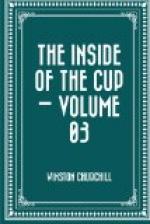His assistant regarded him a moment in silence. Although Hodder had no intention of explaining his reasons, he had a curious conviction that it were superfluous to do so, that McCrae had guessed them.
“Why shouldn’t ye? There’s but a handful left to preach to in this weather.”
“I wouldn’t go, in this sudden way, if it were not imperative,” Hodder added, trying to speak calmly.
“Why shouldn’t ye?” McCrae repeated, almost fiercely.
Hodder smiled in spite of himself.
“There’s no reason,” he said, “except the added work put on you without warning, and in this heat.”
“Ye’ll not need to worry,” his assistant assured him, “the heat’s nothing to me.” McCrae hesitated, and then demanded abruptly, “Ye’ll not be visiting?”
The question took Hodder by surprise.
“No,” he answered quickly, and not quite steadily, and hesitated in his turn, “I shan’t be visiting.”
“It’s a rest ye need, I’ve been wanting to say it.” McCrae took a step forward, and for a moment it seemed as though he were at last about to break the bonds of his reserve. Perhaps he detected an instinctive shrinking on the rector’s part. At any rate, there was another instant of silence, in which the two men faced each other across the desk, and McCrae held out his hand. “Good luck to ye,” he said, as Hodder took it, “and don’t have the pariah on your mind. Stay till ye’re rested, and come back to us.”
He left the room abruptly. Hodder remained motionless, looking after him, and then, moved apparently by a sudden impulse, started toward the door,—only to halt and turn before he got to it. Almost he had opened his lips to call his assistant back. He could not do it—the moment had come and fled when it might have been possible. Did this man hide, under his brusqueness and brevity of speech, the fund of wisdom and the wider sympathy and understanding he suspected? Hodder could have vouched for it, and yet he had kept his own counsel. And he was struck suddenly by the significance of the fact, often remarked, that McCrae in his brief and common-sense and by no means enlivening sermons had never once referred in any way to doctrine or dogma!
He spent half an hour in collecting and bestowing in two large valises such articles as his simple needs would demand, and then set out for a railroad office in the business portion of the city, where he bought his ticket and berth. Then, after a moment of irresolution on the threshold of the place, he turned to the right, thrusting his way through the sluggish crowds on Tower Street until he came to the large bookstore where he had been want to spend, from time to time, some of his leisure moments. A clerk recognized him, and was about to lead the way to the rear, where the precious editions were kept, when Hodder stopped him.
In casting about for a beginning in his venture over unknown seas, there had naturally come into his mind three or four works which were anathema to the orthodox; one of which, in seven volumes, went back to his seminary days, and had been the subject of a ringing, denunciatory sermon by the dean himself. Three of them were by Germans of established reputations, another by a professor of the University of Paris. The habit of years is strong.




